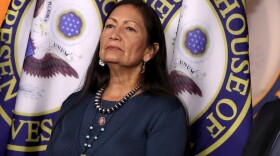
Kirk Siegler
As a correspondent on NPR's national desk, Kirk Siegler covers rural life, culture and politics from his base in Boise, Idaho.
His beat explores the intersection and divisions between rural and urban America, including longer term reporting assignments that have taken him frequently to a struggling timber town in Idaho that lost two sawmills right before the election of President Trump. In 2018, after the deadliest and most destructive wildfire in California history, Siegler spent months chronicling the diaspora of residents from Paradise, exploring the continuing questions over how – or whether – the town should rebuild in an era of worsening climate-driven wildfires.
Siegler's award winning reporting on the West's bitter land use controversies has taken listeners to the heart of anti-government standoffs in Oregon and Nevada, including a rare interview with recalcitrant rancher Cliven Bundy. He's also profiled numerous ranching and mining communities from Nebraska to New Mexico that have worked to reinvent themselves in a fast-changing global economy.
Siegler also contributes extensively to the network's breaking news coverage, from floods and hurricanes in Louisiana to deadly school shootings in Connecticut. In 2015, he was awarded an international reporting fellowship from Johns Hopkins University to report on health and development in Nepal. While en route to the country, the worst magnitude earthquake to hit the region in more than 80 years struck. The fellowship was cancelled, but Siegler was one of the first foreign journalists to arrive in Kathmandu and helped lead NPR's coverage of the immediate aftermath of the deadly quake. He also filed in-depth reports focusing on the humanitarian disaster and challenges of bringing relief to some of the Nepal's far-flung rural villages.
Before helping open the network's first ever bureau in Idaho at the studios of Boise State Public Radio in 2019, Siegler was based at the NPR West studios in Culver City, California. Prior to joining NPR in 2012, Siegler spent seven years reporting from Colorado, where he became a familiar voice to NPR listeners reporting on politics, water and the state's ski industry from Denver for NPR Member station KUNC. He got his start in political reporting covering the Montana Legislature for Montana Public Radio.
Apart from a brief stint working as a waiter in Sydney, Australia, Siegler has spent most of his adult life living in the West. He grew up in Missoula, Montana, and received a journalism degree from the University of Colorado at Boulder.
-
Republicans are pressuring President Biden to withdraw his nominee to be the country's next public lands chief amid controversy over her alleged involvement in a tree spiking incident in the 1980s.
-
Federal officials warn of a long, potentially dangerous summer of fire. Since January, more than a million acres have burned from more than 28,000 wildfires.
-
States with the lowest vaccination rates are clustered in the South and the Southwest. But there's one standout, New Mexico, where health officials now say some counties are close to 90% vaccinated.
-
If confirmed, environmental leader Tracy Stone-Manning would be the first permanent director of the Bureau of Land Management in four years.
-
The pandemic has made the housing market even tighter in the mountain West, where first-time buyers are trying to decide whether this is just the future or a bubble headed eventually for a bust.
-
Some conservative, rural states have resettled refugees at the highest per capita rates. In Idaho, employers applaud President Biden's pledge to lift a Trump-era cap on refugee numbers.
-
In rural Arizona, the Border Patrol is now dropping off migrants from overflowing detention facilities in small towns that are cut off from transportation and other services.
-
People are trying to come to grips with Monday's mass shooting at a grocery store. A 21-year-old man from suburban Denver has been charged with 10 counts of murder in the first degree.
-
Interior Secretary Deb Haaland has a long and seemingly insurmountable to-do list, including a pledge to begin repairing a legacy of broken treaties and other abuses against tribes.
-
Of the 109 people currently listed as missing in South Dakota, 77 of them are indigenous. The state's legislature passed a bill this week to address the alarming crisis on and off reservations.









